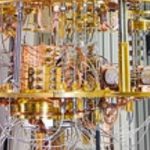Interview with Dr. Wegner, Vice President Artificial Intelligence & Data Analytics at Lufthansa Industry Solutions: “Power of quantum computing huge thanks to simultaneous processing”

(HamburgNews) “The technology is still in its infancy,” Dr. ing. Susan Wegner, Vice President Artificial Intelligence & Data Analytics at Lufthansa Industry Solutions told Hamburg News in interview in which she discusses quantum computing. IQT-News summarizes the article below.
Companies across the board can turn to quantum computing as all kinds of applications are possible, especially for optimisation purposes, advises Dr. Wegner. “Aviation is a good example. Flight optimisation is a highly complex topic. When is an aircraft expected at the terminal? When are the crew and passengers expected? Where are the luggage and catering? If just one factor jars with the calculation, e.g., if the crew becomes stuck in a traffic jam, the calculation chain breaks down. Quantum computers can adapt and instantly bring the calculation back up to date.” The same applies to shipping routes or supply chains, she added. But quantum computing can also be used for simulations in the development of medicines or for highly complex climate change calculations.
The D-Wave quantum annealer with more than 5,000 qubits. was presented in Jülich, North Rhine-Westphalia in January. “However, an annealer is only designed for very specific tasks and has a limited range of applications. But the technology is advancing rapidly,” Dr. Wegner pointed out. Research is focusing mainly on troubleshooting at present. Even minimal influences, such as electric or magnetic fields, upset the qubits. “However, it’s critical for companies to identify potential operational applications today and secure the talent needed to establish this new technology.”
Quantum computing is by no means mere sci-fi as evidenced by the IBM Quantum System One in Ehningen, which works with 27 qubits. A qubit is the smallest computational and informational unit of a quantum computer that, unlike classical bits – 1 or 0 – can be in both states and everything in between, which explains its enormous computing power.
Researchers at the University of Hamburg are leading the way and are building a next-generation quantum computer as part of the Rymax project through 2027, which is being funded by the Germany Ministry of Education and Research to the tune of EUR 10 million. Hamburg offers great prerequisites for significantly advancing this key technology as the Centre for Optical Quantum Technologies (ZOQ) and the Institute for Laser Physics are based in the city. The project also involves other key movers and shakers such as the Otto Group and Hamburger Hafen und Logistik AG (HHLA).



















